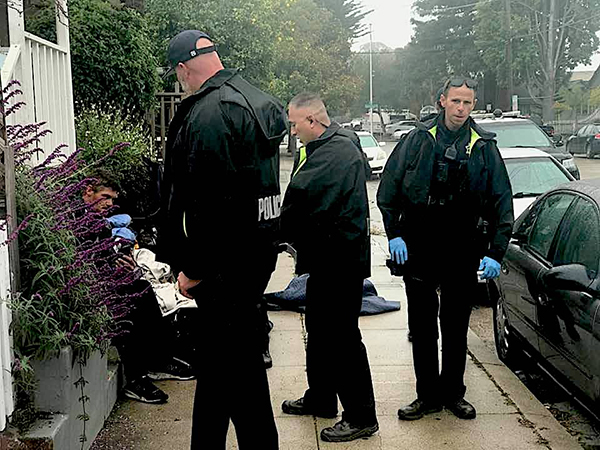
Photo / Keith McHenry
SANTA CRUZ, CA — Margaret stands before the Food Not Bombs meal clearly in shock. Her vehicular home was towed. She has lost everything to the scrap yard. “Is there a shelter?” the white-haired woman asks.
I had just received an email update on shelter availability so I thought she might be in luck. I call the new number but they don’t pick up. I give her the number, “Keep trying,” I urge. The email also suggested people could get a bed if they go to a Salvation Army lot on Limekiln. Joe agrees to drive her to the new intake location. But they can only add her name to the growing list of people seeking shelter. When she returns I give her a cheap three-person tent. Our volunteer, Joe, clears out a space on dirt and helps her set up her new home, adding an eleventh nylon shelter to the grounds bordering the daily Food Not Bombs meal. Robin finds a blanket in the donations and hands it to Margaret, who carefully spreads it out across the thin floor of her new accommodations.
Margaret joins a parade of people, often older single women, who have been aggressively ticketed by the city till they are unable to register their vehicular home, and are forced to secure a tent and a scrap of ground.
In the face of an eviction crisis that promises to be even more dire than that of the Great Depression, the Santa Cruz City Council passed, as of Tuesday, October 26, 2021, an ordinance banning oversized vehicles from parking on city streets from midnight through 5 a.m. It is already a crime to sleep in your vehicle.
The ordinance classifies oversized vehicles as 20 or more feet long, or 8 or more feet high and 7 feet wide. Alongside the overnight parking ban, oversized vehicles would also be prohibited from using electric, gas and utility connections, open fires, having unattached trailers, maintaining ‘unsafe and unsanitary’ conditions, and parking within 100 feet of intersections. One local media site, Lookout, reported that they had counted at least 65 vehicular homes on the Westside of Santa Cruz. Many people faced with eviction have prepared for that distressing day by purchasing an RV, a trend that is visible on the streets of California.
The council also voted to “create at least 30 parking spots and safe parking programs within four months.” The city paid the Association of Faith Communities $328,000 in 2020 to manage the program, which is inaccessible to most of the several hundred people who make their vehicles home. The program is no more than a parking space and a few portable toilets. Like all services for the unhoused, most of the funding goes to administration.
Those seeking one of the 30 dusk to dawn parking spaces must provide a current driver’s license and proof that the vehicle is registered and insured. Even when our friends meet these requirements people are denied access at the whim of the intake director.
Most people are not able to overcome these obstacles, since the city makes sure you are issued so many tickets that registration is financially out of reach.
The COVID hotels, and whatever additional shelter space was provided, are also closing, driving another 200 people into the crowded camps, adding to a crisis that government officials have no plan to humanely solve.
Keith McHenry is co-founder of Food Not Bombs.

